
by Tara Bergman (USA) | Jul 25, 2014 | 2014, Kids, Motherhood, Parenting, Tara B., Transportation, Travel, USA, Vacationing, World Motherhood, Younger Children
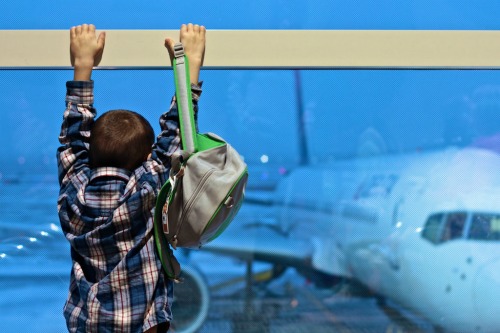 It was the final leg of our most recent trip. It should have been a 5 ½ hour direct flight, but due to weather delays, it ended up being 8 hours inside a plane. My husband and I were traveling with our sons, ages 8 and 4, and we were seated on opposite sides of the same row. I was seated with my 4 year old and an older woman. In front of us was a family: mom, dad, 4 year old boy, and a girl approximately 15 months old on the mom’s lap. It was an evening flight, and the kids in front of me were in pj’s, clearly indicating the parents’ hope that they would fall asleep upon take off. Things couldn’t have gone more differently. (more…)
It was the final leg of our most recent trip. It should have been a 5 ½ hour direct flight, but due to weather delays, it ended up being 8 hours inside a plane. My husband and I were traveling with our sons, ages 8 and 4, and we were seated on opposite sides of the same row. I was seated with my 4 year old and an older woman. In front of us was a family: mom, dad, 4 year old boy, and a girl approximately 15 months old on the mom’s lap. It was an evening flight, and the kids in front of me were in pj’s, clearly indicating the parents’ hope that they would fall asleep upon take off. Things couldn’t have gone more differently. (more…)
Tara is a native Pennsylvanian who moved to the Seattle area in 1998 (sight unseen) with her husband to start their grand life adventure together. Despite the difficult fact that their family is a plane ride away, the couple fell in love with the Pacific Northwest and have put down roots. They have 2 super charged little boys and recently moved out of the Seattle suburbs further east into the country, trading in a Starbucks on every corner for coyotes in the backyard. Tara loves the outdoors (hiking, biking, camping). And, when her family isn't out in nature, they are hunkered down at home with friends, sharing a meal, playing games, and generally having fun. She loves being a stay-at-home mom and sharing her experiences on World Moms Network!
More Posts

by Elizabeth Atalay | Jun 24, 2014 | 2014, Africa, Awareness, Babies, Birthing, Ethiopia, Health, Humanitarian, Maternal Health, Millennium Development Goals, Motherhood, Newborn Health, Pregnancy, Save The Children, Social Good, Third Eye Mom, Travel, World Moms Blog, World Voice
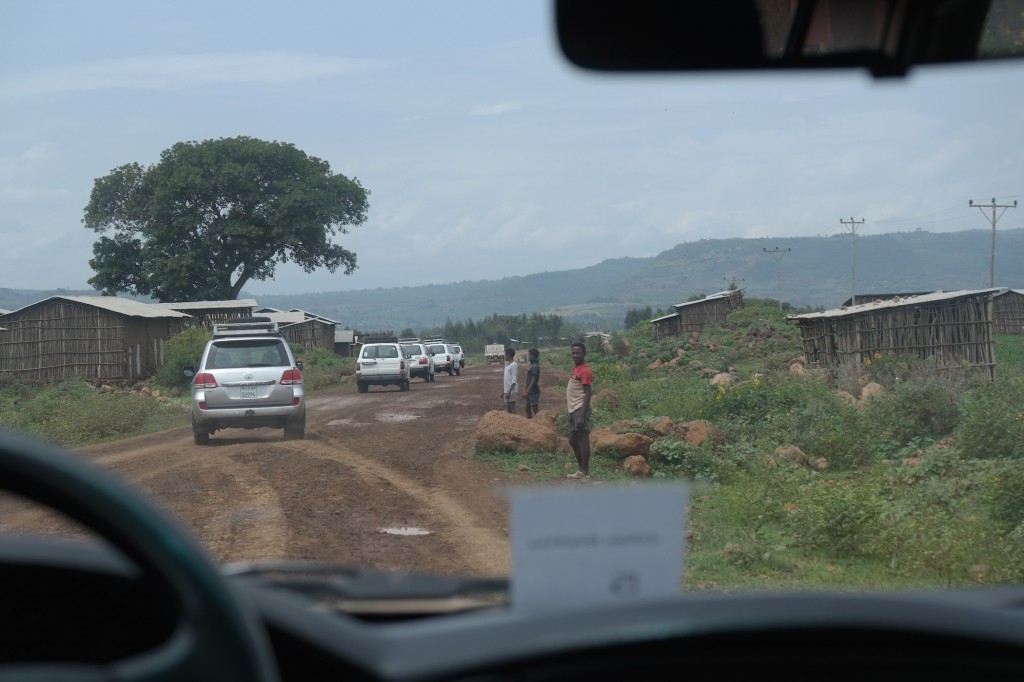
We had just spent the night at the source of the Blue Nile River. Lake Tana sits in Bahir Dar, Ethiopia, and as our caravan of Land Cruisers wove through the countryside from Bahir Dar to Mosebo I took in deep gulping breaths of sweet fresh Ethiopian air. The lush colors of our surroundings looked to me like they had been enhanced in Photoshop in the way that everything seemed to pop. How could I feel this emotional connection to place that was never mine? A place I had never been?
Though this is my first time in Ethiopia, the verdant landscape brought me back to other rural parts of Africa I’d traveled through in my youth, similar topographies that had stayed with me ever since. This time I’d returned to the continent as a new media fellow with the International Reporting Project to report on newborn health. World Moms Blog Editor Nicole Melancon of ThirdEyeMom is a fellow on the trip as well, and last week wrote about our initial overview of maternal and newborn health in Ethiopia. Now we were heading to one of the villages housing a Health Post, which serves the local and surrounding population of approximately 3,500 people.
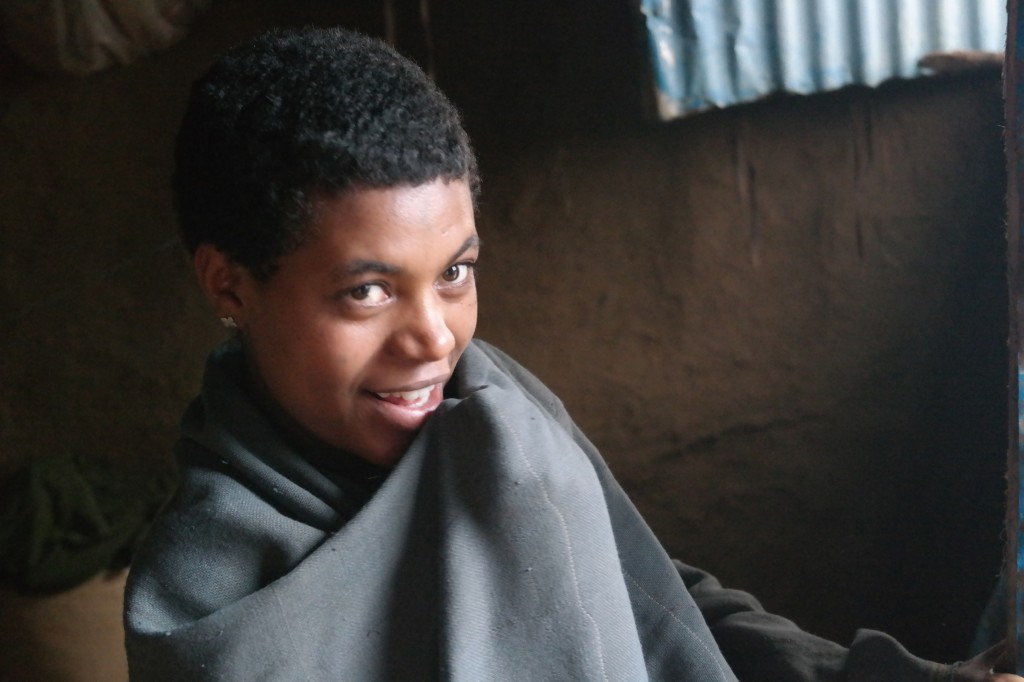
Mosebo Village is part of Save The Children’s Saving Newborn Lives program, and as such is looked to as a model village in the Ethiopian Government’s plan to reduce maternal and newborn mortality. Mosebo is a rural agrarian community that produces wheat, teff and corn. There I met seven-year-old Zina whose mother, Mebrate was about to give birth. Through our translator Mebrate estimated her age to be around 26, and told us that Zina was her first child. For economic reasons she and her husband had waited to have a second. When she had Zina, Mebrate had gone to her parent’s home to give birth, as women in Ethiopia often do. It is estimated that 80% of Ethiopian mothers will give birth in their home, often without a trained health care attendant. Towards the end of Mebrate’s first pregnancy she went to live with her parents as her family instructed, until after the baby was born. In that way her mother could help her deliver, could care for her and the baby, and feed her the traditional porridge after birth. Although there were no complications during her delivery, sadly, many young mothers giving birth at home are not as fortunate. The time period during and around birth are the most vulnerable for the lives of both the mothers and babies. The Saving Newborn Lives Program aims to reduce maternal and newborn mortality beginning with awareness programs and antenatal care on the local level at Health Posts like the one we visited in Mosebo.
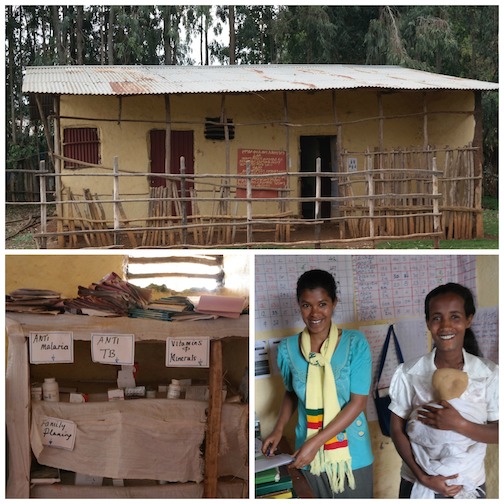
The Mosebo Health Post and Health Extension Workers
We had met Tirgno and Fasika, the two Health Extension Workers at the Mosebo Health Post earlier that day as they showed us the two room interior, and explained their role in improving maternal and newborn health. They work to raise awareness in the community about the importance of antenatal care, and the potential dangers of giving birth at home for both mother and child. Newborn health is interdependent with maternal health, and the most prevalent causes of newborn mortality, infection, Asphyxiation, pre-maturity or low birth weight, and diarrhea can often be avoided with proper care. These days in Mosebo after receiving antenatal care at the Health Post women are then referred to the regional Health Center for deliveries.
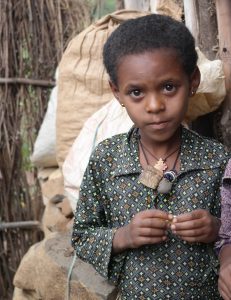
Zina shyly smiled when we ask her how she felt about having a new sibling, she stood straight and tall listening intently as we asked her mother about the babies’ arrival. When Mebrate goes into labor this time, with her second child, she will embark on the walk along rural dirt roads for around an hour to the nearest Health Center to give birth.
Elizabeth Atalay is reporting from Ethiopia as a fellow with the International Reporting Project (IRP). This is an original post written for World Moms Blog.
You can follow all IRP reports by World Moms Elizabeth Atalay & Nicole Melancon at #EthiopiaNewborns

Elizabeth Atalay is a Digital Media Producer, Managing Editor at World Moms Network, and a Social Media Manager. She was a 2015 United Nations Foundation Social Good Fellow, and traveled to Ethiopia as an International Reporting Project New Media Fellow to report on newborn health in 2014. On her personal blog, Documama.org, she uses digital media as a new medium for her background as a documentarian. After having worked on Feature Films and Television series for FOX, NBC, MGM, Columbia Pictures, Warner Brothers, 20th Century Fox, and Castle Rock Pictures, she studied documentary filmmaking and anthropology earning a Masters degree in Media Studies from The New School in New York. Since becoming a Digital Media Producer she has worked on social media campaigns for non-profits such as Save The Children, WaterAid, ONE.org, UNICEF, United Nations Foundation, Edesia, World Pulse, American Heart Association, and The Gates Foundation. Her writing has also been featured on ONE.org, Johnson & Johnson’s BabyCenter.com, EnoughProject.org, GaviAlliance.org, and Worldmomsnetwork.com. Elizabeth has traveled to 70 countries around the world, most recently to Haiti with Artisan Business Network to visit artisans in partnership with Macy’s Heart of Haiti line, which provides sustainable income to Haitian artisans. Elizabeth lives in New England with her husband and four children.
More Posts

by ThinkSayBe | Mar 28, 2014 | 2014, Africa, Communication, Cultural Differences, Culture, Economy, International, Language, Life Lesson, Poverty, Travel, Vacationing, World Motherhood
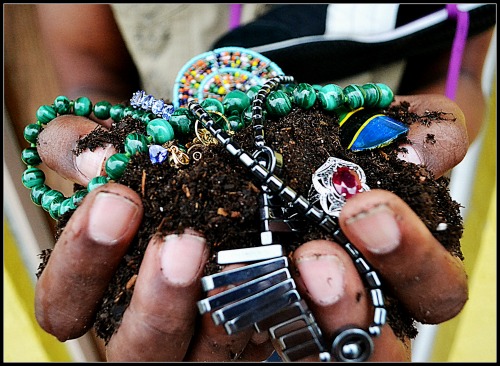 “Hey bro, vipi? How much for these shoes?” I ask the second-hand market vendor.
“Hey bro, vipi? How much for these shoes?” I ask the second-hand market vendor.
“Ah! Those, for you, those are $30 U.S.dollars,” he responds with a tone indicating that he’s giving me a deal. He didn’t know I was Tanzanian, maybe because I hadn’t yet spoken more than a few words in Kiswahili. Words that any foreigner who cared to find out would have known.
“$30?! I can get a new pair of shoes in the U.S. for that amount!” I say in return, flabbergasted by the price this man just gave me.
After a few minutes of haggling, going back and forth about the quality of the shoes, and his realization of my nationality, we do not close the sale of these shoes, but commence having a very important conversation about the poverty of Africa.
I will call this man Peter, as I do not recall his name.
As I talked down the price of the shoes, Peter said things like, “You people have money!” and “Come on, you can pay this amount easily.”
When Peter and I started talking (immediately after I decided not to purchase the shoes), I asked him his reasons behind hiking prices up so high for foreigners. He simply said, “Because we are poor here in Tanzania, and in Africa, so I have to try to earn money some way, and you guests have the money.” (more…)
I am a mom amongst some other titles life has fortunately given me. I love photography & the reward of someone being really happy about a photo I took of her/him. I work, I study, I try to pay attention to life. I like writing. I don't understand many things...especially why humans treat each other & other living & inanimate things so vilely sometimes. I like to be an idealist, but when most fails, I do my best to not be a pessimist: Life itself is entirely too beautiful, amazing & inspiring to forget that it is!
More Posts
Follow Me:


by Purnima Ramakrishnan | Mar 11, 2014 | 2014, Brazil, Humanitarian, International, Poverty, Purnima, Social Good, The Alchemist, Travel, World Moms Blog, World Voice, Writing
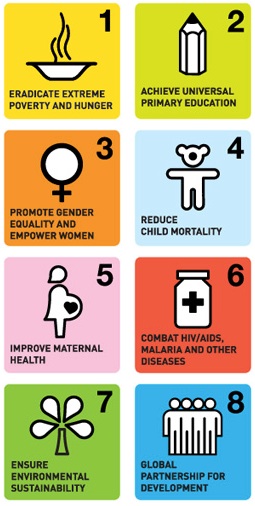
United Nations Foundation
Sometime back I wrote in my personal blog that I am ‘NOT’ a globe-trotting mama. But here I am getting ready for my next adventure all over Brazil.
I am honored and proud to officially announce that I have been selected to receive a fellowship in Journalism and will be reporting from Brazil for the International Reporting Project as part of the John Hopkins School of Advanced International Studies. I shall be reporting about reduction of poverty and hunger in Brazil, and how it has embraced the Millennium Development Goals to improve the lives of its citizens.
Here at World Moms Blog, working for the MDGs has been something close to our hearts. And hence this trip is also very close to my heart where I will be learning so much and sharing what we do here at World Moms Blog through media and through the power of mothers. Having launched the Moms4MDGs campaign in Chicago, during BlogHer13 and following up very closely and working with it has made me feel very passionate about this cause.
As I brace myself for a hectic fortnight in the 2nd and 3rd week of April, where we may go back-packing and camping in rural and sub-urban Brazil, one thought comes to my mind – What is it that I am going to achieve, apart from the learning and all the anticipated fun? I really don’t know that yet.
I only know that this trip is going to be very special in so many ways.
I have written posts about the 8 MDGs in the past about a few topics including Environment, Eco-feminism, reducing Infant mortality rate, child-health, Social issues and empowerment of girl child and women. I now also look forward to learn more about reduction of health, poverty, hunger and improvement of the lifestyle of citizens by the sustained effort of various individuals and organizations.
This trip is going to take me places very rugged and rustic like rural villages where connectivity could be difficult, I understand. It makes me a bit concerned, honestly. Not being in touch with my family, especially my son every single moment is going to be difficult. I leave him in good care and support; however this phase sure will be tricky to cope.
We do not have a detailed itinerary yet, but I know that it is going to be exciting. Exciting? Yes, at times, IRP fellows have also met with Presidents/Prime Ministers of the countries they visit. So, it is just not back-packing and camping and reporting from the villages. It is also meeting with the decision makers and understanding how the entire system works.
Anybody want to guess what came in the mail yesterday? A luggage tag featuring the WMB lady, just in time for my travels. Jen, Thank you! I love this so much and as I pack my bags for Brazil, this is something which will always remind me of the love and comradeship of this beautiful group.
Please look forward to my everyday thoughts and stories, and possibly photographs, video posts, blog posts, slideshows, updates on social networks, assuming I have a good internet connection.
You can track my posts from this trip at #Moms4MDGs.You can track all posts from this trip using #BrazilMDGs.
I will be tweeting from both @WorldMomsBlog and @Puma_Vinod. I will vicariously be posting on Facebook both on my personal profile and World Moms Blog profile too.
Please feel free to ask me any questions and leave your comments about this trip. I would also love to read any of your insights on Brazil.
This is the first of the many posts credited to the International Reporting Project (IRP), as part of my reporting from Brazil on this fellowship.
Photo credit United Nations Foundation.
This is an original post written by Purnima Ramakrishnan for World Moms Blog.

by Ana Gaby | Mar 6, 2014 | 2014, Communication, Family Travel, Home, Indonesia, International, Kids, Living Abroad, Motherhood, Parenting, Travel, World Motherhood, Younger Children
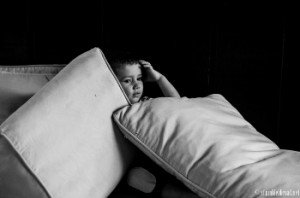 Not too long ago, my four-year-old started understanding the concept of fairness vs. unfairness. To him, life is unfair, oh so many times ,during the day. To me, the fact that he can express his frustration over a denied chocolate treat before dinner or being sent back to sleep in his room when he tries to sneak into mom and dad’s bed, is just another sign of my toddler becoming a big boy.
Not too long ago, my four-year-old started understanding the concept of fairness vs. unfairness. To him, life is unfair, oh so many times ,during the day. To me, the fact that he can express his frustration over a denied chocolate treat before dinner or being sent back to sleep in his room when he tries to sneak into mom and dad’s bed, is just another sign of my toddler becoming a big boy.
Evan has not only learned to voice his frustration but has become a strong little boy with convictions. He will call my husband and I out on our mistakes and let us know how he believes what we are doing is not fair and shouldn’t be done. Sometimes I just chuckle, but sometimes my heart just skips a beat. For Evan, unfairness is represented by tangible things he cannot have or those few extra minutes in front of the TV that he wasn’t allowed. I feel so blessed that, so far, this is all the unfairness he has had to face. (more…)
Ana Gaby is a Mexican by birth and soul, American by heart and passport and Indonesian by Residence Permit. After living, studying and working overseas, she met the love of her life and endeavored in the adventure of a lifetime: country-hopping every three years for her husband’s job. When she's not chasing her two little boys around she volunteers at several associations doing charity work in Indonesia and documents their adventures and misadventures in South East Asia at Stumble Abroad.
More Posts

by Sarah Sensamaust | Feb 26, 2014 | 2014, Africa, Cultural Differences, Expat Life, Family, Family Travel, World Motherhood
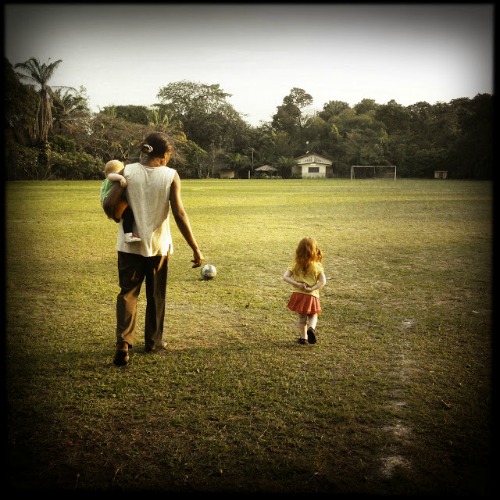 In about three months our lives will drastically change. My husband and I, with our two little girls, will leave the place we’ve called home for the last six years. We will probably never return.
In about three months our lives will drastically change. My husband and I, with our two little girls, will leave the place we’ve called home for the last six years. We will probably never return.
When we first came to Congo, we didn’t know much about the place, we didn’t know a soul here and we definitely didn’t have plans to start a family in this country. My, how everything’s changed.
Just as we had a “feeling” we should move to Congo. Now we have that same “feeling” that it’s time for us to leave. It just feels right and we have wonderful plans on the horizon, but boy is this hard. In fact, we’re feeling a bit lost in our last months here. This is the only home our children have ever known. Our girls have been loved by the nanny or “Mama” who’s helped us raise them for as long as they’ve been loved by us. This will be hard, but it is time.
And so I have lots of questions about how to do this, but more importantly how to do this right. Will there be something meaningful I forget to say or do? Do we make a big deal out of our last goodbyes? Or are our children really too young to understand? There will be tears. There might even be sobs. I hope we don’t needlessly upset them.
I can’t help but think about how much easier our departure would be if we didn’t have children. Their two little lives became a game changer for us living in Congo. Once we had children and the people around us began to care for them and love them, I could feel the roots sprout from my feet and bind us here. They helped us burp our girls when they were babies, nurse them back to health when they were sick, they’ve memorized their every tick and tock. This will be hard, but it is time.
Will our children have any authentic memories from these first years of their lives? Or will their only understanding of Congo come through the stories we tell them over and over? Will the photos they see when they’re older be the only images that remain in their heads? This will be hard, but it is time.
My husband and I always say the hardest part about living abroad is the leaving part. Goodbyes in your host country are usually forever. Sure, it’s hard leaving the United States and saying goodbye to parents and grandparents, but you know they’ll always be a part of your life. You’ll see them again. They’re your home base. They have the internet and email and Facebook and all those other lovely things that keep up connected to those we care about in the States.
When we leave Congo, there will be no email updates. We will not see pictures of the loved ones we leave here. We will miss births and weddings and all the minutiae in between that founded our friendships. This will be hard, but it is still the right time.
Has anyone left the country in which you’ve raised your children, never to return? Was there anything you did to make your last days meaningful or your departure easier?
This is an original post written for World Moms Blog by Sarah. You can find Sarah blogging with Jill Humphrey at Mama Congo.
Photo credit to Jill humphrey.

 It was the final leg of our most recent trip. It should have been a 5 ½ hour direct flight, but due to weather delays, it ended up being 8 hours inside a plane. My husband and I were traveling with our sons, ages 8 and 4, and we were seated on opposite sides of the same row. I was seated with my 4 year old and an older woman. In front of us was a family: mom, dad, 4 year old boy, and a girl approximately 15 months old on the mom’s lap. It was an evening flight, and the kids in front of me were in pj’s, clearly indicating the parents’ hope that they would fall asleep upon take off. Things couldn’t have gone more differently. (more…)
It was the final leg of our most recent trip. It should have been a 5 ½ hour direct flight, but due to weather delays, it ended up being 8 hours inside a plane. My husband and I were traveling with our sons, ages 8 and 4, and we were seated on opposite sides of the same row. I was seated with my 4 year old and an older woman. In front of us was a family: mom, dad, 4 year old boy, and a girl approximately 15 months old on the mom’s lap. It was an evening flight, and the kids in front of me were in pj’s, clearly indicating the parents’ hope that they would fall asleep upon take off. Things couldn’t have gone more differently. (more…)






 “Hey bro, vipi? How much for these shoes?” I ask the second-hand market vendor.
“Hey bro, vipi? How much for these shoes?” I ask the second-hand market vendor.













